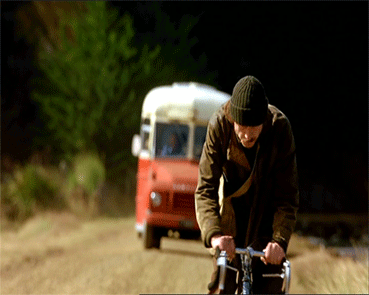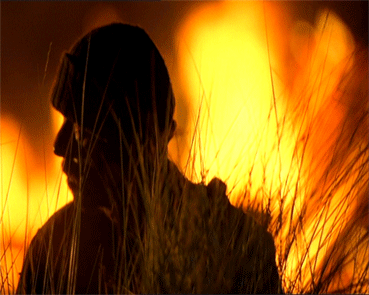|

Talk us through itOn the 13th November 1990 gunman David Gray killed a total of thirteen people in the sleepy Otago seaside village of Aramoana in New Zealand's deep south. Robert Sarkies in Out of the Blue takes the viewer through the fateful day, highlighting the courage showing by residents and police officers responding to the unexpected carnage, but also giving brief glimpses into the fractured final day of David Gray himself.Ready to crawl around the local ditches?
Review"I appreciate your professional approach, you don't get it everywhere. The town's fill of idiots and incompetents." - David GrayStrangely Robert Sarkies begins his movie with some unknown dude on a beach using a metal detector, the sounds of the surf bleeds into an emotive soundtrack that will be used sparingly through the rest of the movie. Our beach comber finds something, guess those metal detectors do work, and we find it's November the 13th 1990 in Aramoana via a title card before Sarkies cuts to an overhead pan of the village from the surrounding hills. Besides being evocative, and the overhead pan shot being used at stages later in the movie, the opening sequence remains unexplained and enigmatic. Either it's David Gray down the beach in solitude or maybe Sarkies is trying to evoke the quiet nature of Aramoana? I guess the main point we should be taking from the opening salvo is that the village is isolated, hemmed in on one side by the sea and on the other by steep hills, with a single road leading in and out. Naturally we next get to meet the meat, to use a term from slasher reviews, as Sarkies narrows his focus to the main participants on the fateful day. The Director uses sound and vision to focus attention on his characters. As we meet each group of people they are constantly in motion, something is happening constantly on screen, they are getting on with their lives on yet another uneventful day. Equally the Director underpins his characters via the use of music. The Bryson morning is played out to the dulcet tones of morning commercial radio, now that's got to be worse listening than the cringe worthy stuff they play here on the senile coast, an old guy has "Blue Smoke" playing while he raises the New Zealand flag, and then decides to have something stronger than a cup of tea to start his morning. Later four ferals are giving an impersonation of having a barbeque, kids don't try that at home, while The Dudes "Bliss" is blasting on the stereo; "Drink yourself some Bliss, forget about the last one, get yourself another". We meet David Gray in an out of focus shot and for the first scene he doesn't present to camera remaining an unknown element. Sarkies is clearly working on the unbalanced nature of Gray's character and for mine he nails the inward looking paranoia of the man. We quickly learn Gray is heavily into guns, constantly smokes roll your owns, and has a fair mob of Roos bounding around in the top paddock. Gray's thin grasp on reality is highlighted by a scene where a police officer is in his crib, seaside weekend shack to you me Russ, what we would call a Batch from where I come from, and the Aussies would call a weekender. Anywise, and lets not get off the point here, the officer is questioning Gray about undies being stolen from local washing lines while poking around the chaotic mess that is Gray's crib. Notable the copper checks the fridge, does Gray only eat canned fish? A cut scene later and we find the fridge is padlocked with our resident Ed Gein on his lonesome. Either Gray is suffering a delusional moment or is remembering something that has happened previously. Either way an effective scene underlying the inherent paranoia Gray feels. David Gray is initially presented as an enigmatic character, the loner slowly descending into cabin fever as his delusions and paranoia grow. Time passes, Director Sarkies is going to take us through the entire day, and people are seizing their day. Kids are catching buses to school, ferals are still asleep, and David Gray is hitting the road on his bike. As a bus passes Gray thinks the kids in the back are laughing at him, but a cut shot later we learn this is more evidence of Gray's growing psychosis. Notable Sarkies uses a long static shot of Aramoana's breakwater to underpin the day moving along, the same angle will be referenced through out the course of the day and night Out of the Blue focuses on. To underline that Gray is on the edge Sarkies focuses on the gunman's last trip to the Otago capital Dunedin. He waits on a bus in Port Chalmers, a village just to the North of Dunedin, which ties in nicely with the introduction of Nick Harvey, a young local Police office and central focus of the last act of the movie, as Harvey walks past the waiting Gray. Having reached Dunedin, and Sarkies keeps the scenes drab to reflect the inner turmoil of Gray's last hours, Gray has a meltdown in a local bank over a $2 bank cheque fee. Leaving the bank he needs time to get his composure back, Sarkies indicating that Gray is only waiting for the wrong spark to set him off. Through the middle third of the movie Sarkies keeps focusing on the ordinary, people simply getting on with their lives, the day heading into late afternoon, and the share ordinariness of it all. When violence does explode it comes, as the movie title suggests, out of the blue and we unexpectedly head down psycho street with Gray losing it completely and starting his rampage. Sarkies doesn't shy away from the fact that a number of Gray's victims were children adding to the intense impact felt when the bullets start flying, the local Police proving to be ill equipped to deal with the situation, and local residents taking a while to work out what's going down. One couple think it's fireworks for example. Sarkies focuses on the courage shown by local residents, the Police infiltrating the town, and goes out of his way to point out that during the night no one knew where Gray was for the most part. It's a long day's journey into night for Aramoana, but when the brown stuff hits the fan Sarkies nails it to general audience applause. 
The Director for the most part simply follows events on the day leading up to Gray's complete breakdown and rampage. This proves to be the film's strongest point and also it's greatest weakness for audiences. The Director makes events all the more meaningful by carefully chronologing what happened during the day and night but it sure takes some time to get to the point, no doubt losing some members of the audience along the way. Sarkies almost presents a dramatisation of events, which isn't quite what we are expecting. I'm not sure showing some feisty pensioner crawling along a ditch, not once but twice, is really going to float anyone's boat to be honest. For sure Helen Dickson displays true bravery in the face of mortal danger, but couldn't we have had something slightly more urgent than a prolonged crawl through a ditch? Sarkies does score well with a serious of vignettes highlighting the impact and actions of the various characters introduced during the first two thirds of the movie, they were a highlight for mine. Surprisingly he even elicits some sympathy for David Gray as the gunman lies dying while the tactical response squad take time out of there busy schedue to light up cigarettes. Karl Urban (Nick Harvey) gets top billing and delivers a commanding performance as the young police officer completely out of his depth. Urban here taking time out of his increasingly hectic Hollywood commitments. Matt Sunderland (David Gray) is simply stunning and delivers a chilling character, you can readily believe Gray is an event waiting to happen as Sunderland keeps it emotionless yet simmering. Lois Lawn (Helen Dickson), Simon Ferry (Gary Holden), Tandi Wright (Julie Anne Bryson), Paul Glover (Paul Knox), and William Kircher (Sgt Stewart Guthrie), are all worth a mention but Urban and Sunderland dominate the movie. Victoria Kelly and Dave Whitehead delivered a striking dramatic score, but Sarkies chooses wisely to underplay it allowing ambient noise and at times complete quiet to add to his atmosphere. When the score does infiltrate the visuals it's emotive and eerie.
Summary ExecutionI missed Out of the Blue at the Sydney Film Festival due to being down with a heavy case of the flu and have been hanging to see the movie ever since. I loved Sarkies previously outing Scarfies and was keen to see if that movie was a one off or if New Zealand did in fact have another Director on the rise. Aro Video finally sent me a copy, the DVD remains sold out in Australia, and I immediately slung the disc in my player. Ironically I had another dose of the flu while watching. I was completely mesmerised by the movie, and watched it straight through twice. As a Director Sarkies is improving rapidly, and the boy sure does know how to get psychos happening on screen. Another movie that delivered despite being highly anticipated, normally a recipe for disappointment.Out of the Blue received very limit cinema exposure, playing mainly to Film Festivals and the like, but is readily available via DVD. You may need to import a copy of the R4 disc however as, if Australia is any example, stocks would have sold out real quick. There's plenty of extras on the single disc, including extensive coverage of the actual events the movie is based on. The movie may be slow moving, the whole point surely, and it may edge into dramatisation territory, not the point, but I'm still going to give it a full endorsement and recommend a viewing to readers. Sarkies is an above average movie maker, and here he delivers a memorable film. Put it on your queue, settle in for a night, and see what comes out of the blue on your screen.
ScaryMinds Rates this movie as ... Take time out to catch this one, another solid effort by the Kiwis. Take time out to catch this one, another solid effort by the Kiwis.
|
